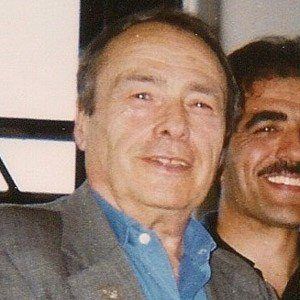Quick Facts

| Full Name | Pierre Bourdieu |
| Occupation | Philosopher |
| Date Of Birth | Aug 1, 1930(1930-08-01) |
| Age | 96 |
| Date Of Death | January 23, 2002, Paris, France |
| Birthplace | France |
| Country | France |
| Horoscope | Leo |
Pierre Bourdieu Biography
| Name | Pierre Bourdieu |
| Birthday | Aug 1 |
| Birth Year | 1930 |
| Place Of Birth | France |
| Birth Country | France |
| Birth Sign | Leo |
| Spouse | Marie-Claire Brizard |
| Children(s) | Emmanuel Bourdieu, Jérôme Bourdieu, Laurent Bourdieu |
Pierre Bourdieu is one of the most popular and richest Philosopher who was born on August 1, 1930 in France, France. Developed the concepts of habitus and symbolic violence to investigate power relations in social life.
He was influenced by Blaise Pascal.
He married Marie-Claire Brizard with whom he had three sons.
Pierre Bourdieu Net Worth
| Net Worth | $5 Million |
| Source Of Income | Philosopher |
| House | Living in own house. |
Pierre Bourdieu is one of the richest Philosopher from France. According to our analysis, Wikipedia, Forbes & Business Insider, Pierre Bourdieu 's net worth $5 Million. (Last Update: December 11, 2023)
He studied at École Normale Supérieure, where his fellow classmate was future notable philosopher Louis Althusser.
He received the Goffman Prize at the University of California, Berkeley.
Height, Weight & Body Measurements
Pierre Bourdieu height Not available right now. Pierre weight Not Known & body measurements will update soon.
Who is Pierre Bourdieu Dating?
According to our records, Pierre Bourdieu married to Marie-Claire Brizard. As of December 1, 2023, Pierre Bourdieu’s is not dating anyone.
Relationships Record : We have no records of past relationships for Pierre Bourdieu. You may help us to build the dating records for Pierre Bourdieu!
Facts & Trivia
Pierre Ranked on the list of most popular Philosopher. Also ranked in the elit list of famous people born in France. Pierre Bourdieu celebrates birthday on August 1 of every year.
Top Facts about Pierre Bourdieu
- Bourdieu studied at École Normale Supérieure in Paris.
- He developed the concept of cultural capital.
- Bourdieu’s work focused on social inequality and power structures.
- He wrote over 25 books and hundreds of articles.
- Bourdieu was a critic of neoliberalism and globalization.
- His theories influenced fields beyond sociology, including education and art history.
- Bourdieu founded the journal Actes de la recherche en sciences sociales.
- He received numerous awards for his contributions to social science research.
- Bourdieu’s work has been translated into over 30 languages.
- He died in 2002 at the age of 71 from cancer complications.
What is Pierre Bourdieu's theory?
Bourdieu believes that cultural capital may play a role when individuals pursue power and status in society through politics or other means. Social and cultural capital along with economic capital contribute to the inequality we see in the world, according to Bourdieu’s argument.
What is Pierre Bourdieu best known for?
Pierre Bourdieu was a renowned sociologist and public intellectual who made significant contributions to general sociological theory, theorizing the link between education and culture, and research into the intersections of taste, class, and education.
What are the 3 types of capital identified by Bourdieu?
Bourdieu, however, distinguishes between three forms of capital that can determine peoples’ social position: economic, social and cultural capital. Health research examining the effects of cultural capital is scarce.
What are the main features of Pierre Bourdieu's theory of class?
In his research on class reproduction, Bourdieu proposes three aspects to determine individuals’ class status: socioeconomic status, class habitus, and cultural and social capitals (Bourdieu and Passeron 1990).
What is Bourdieu's habitus?
In Bourdieu’s words, habitus refers to “ a subjective but not individual system of internalised structures, schemes of perception, conception, and action common to all members of the same group or class ” (p. 86).